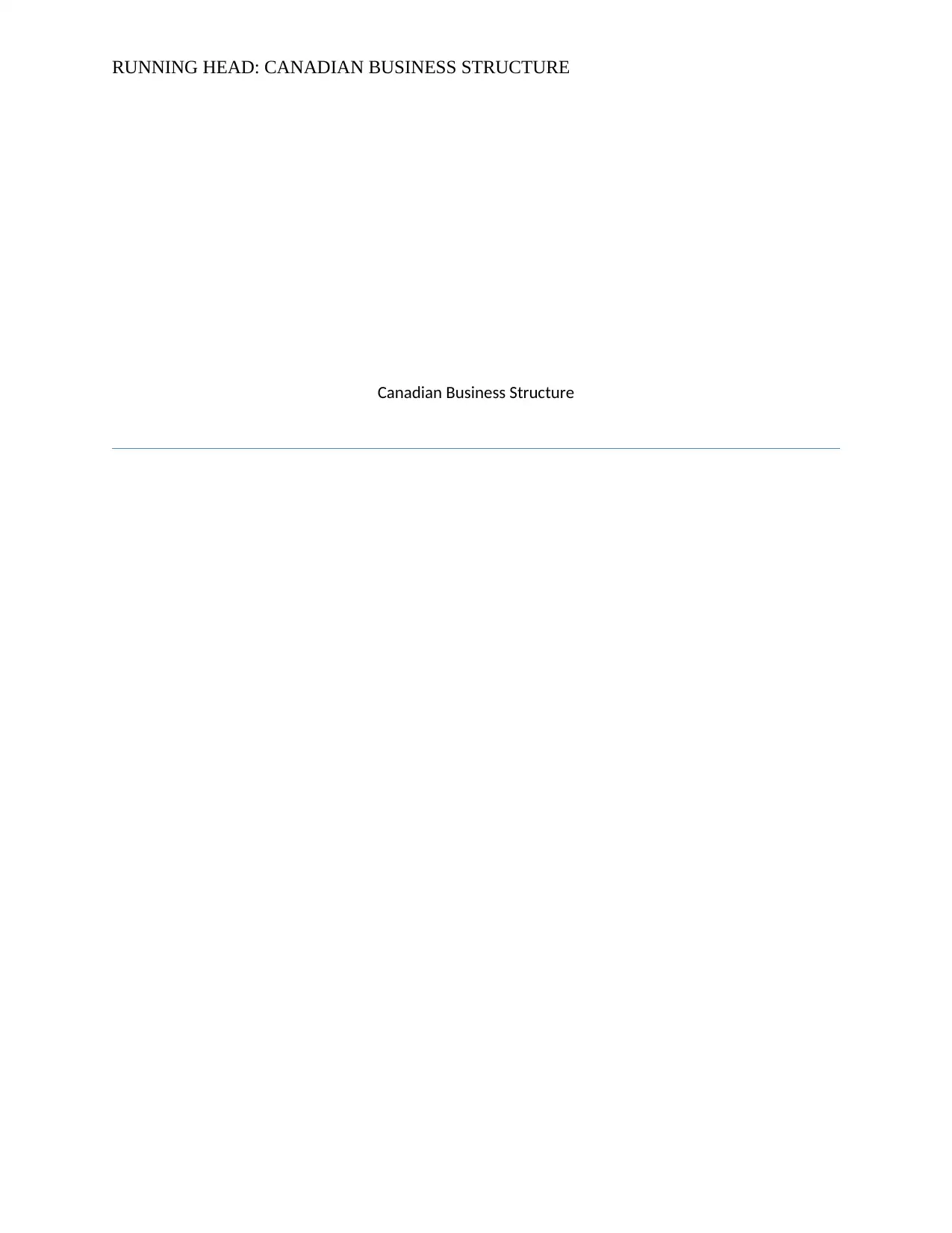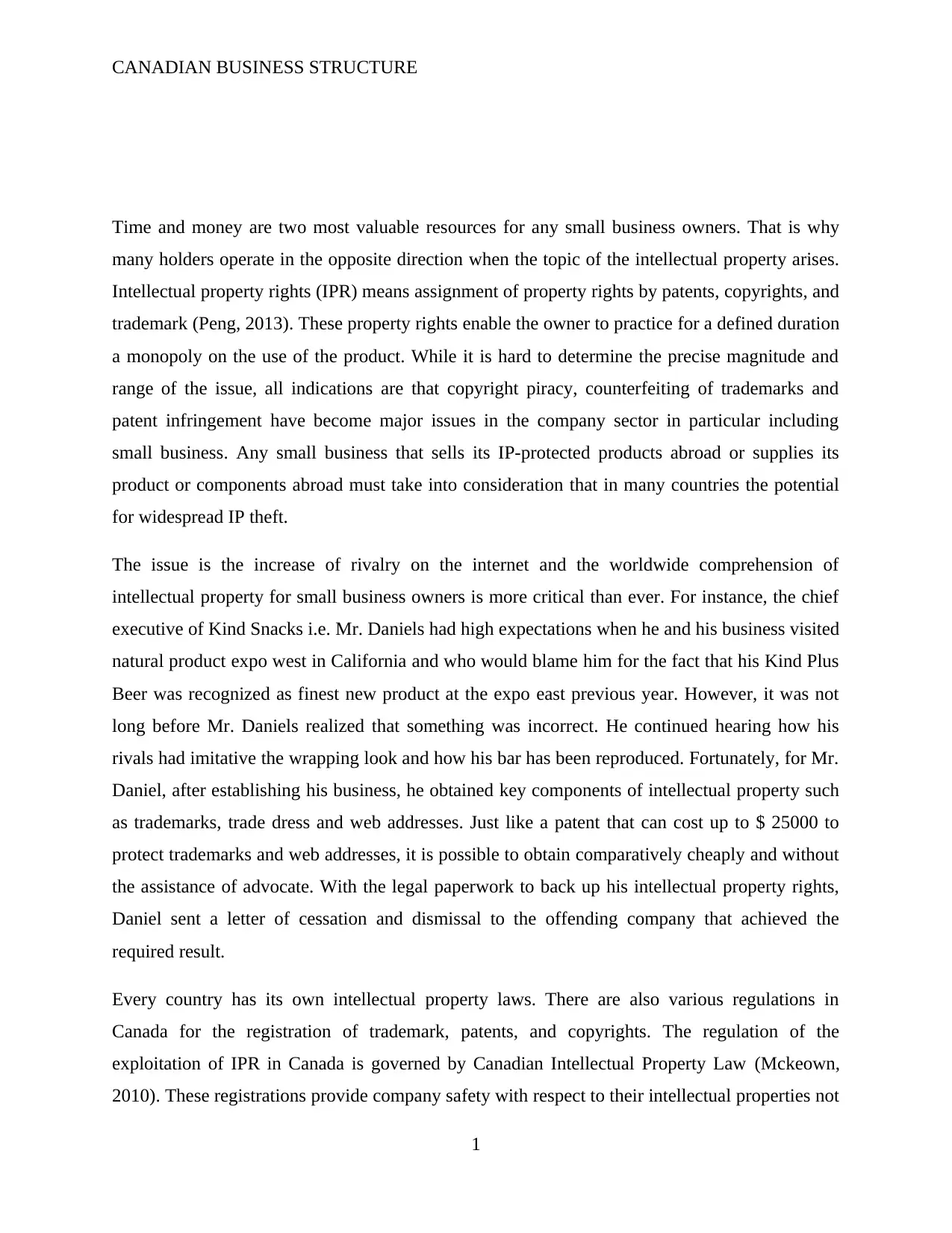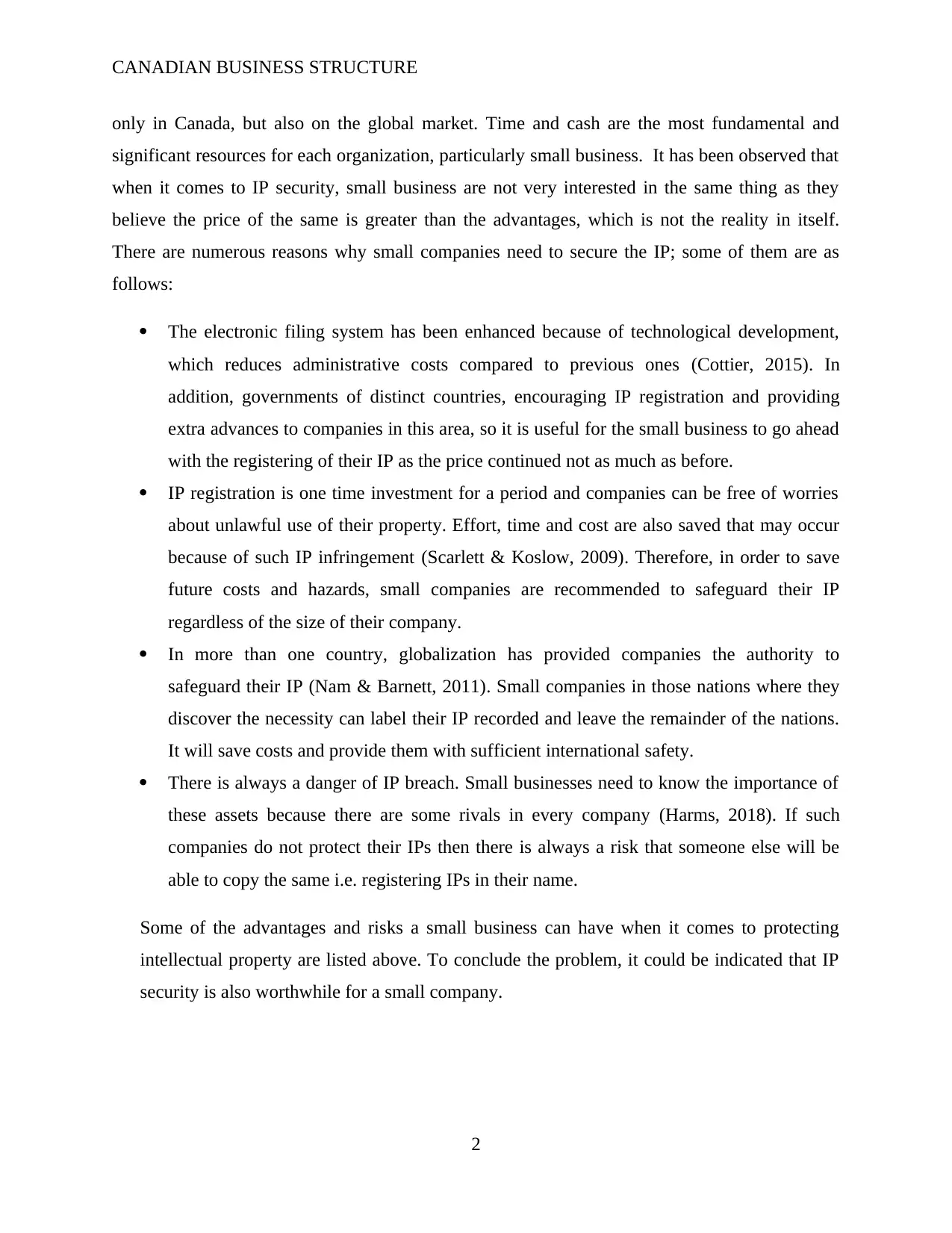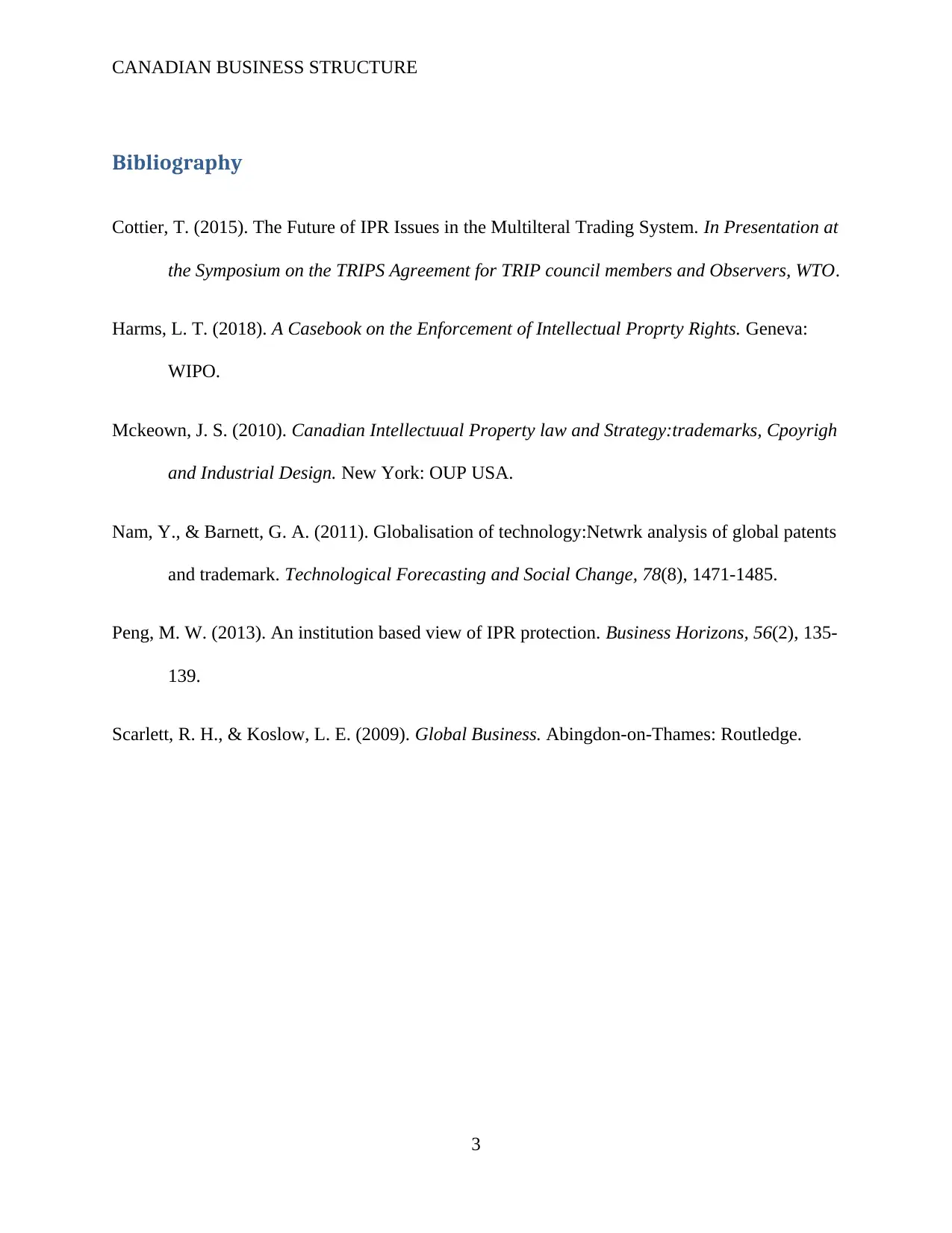Intellectual Property and Canadian Business Structure Analysis
VerifiedAdded on 2022/11/24
|4
|1010
|180
Report
AI Summary
This report examines the significance of intellectual property rights (IPR) for small businesses in Canada. It emphasizes the value of trademarks, patents, and copyrights in protecting business assets. The report highlights the challenges small businesses face regarding IP theft, especially in the digital age and global market. It provides examples of how businesses like Kind Snacks have successfully protected their IPR through trademarks and legal action. Furthermore, it explores the importance of IP registration, the benefits of electronic filing, and government incentives. The report also addresses the risks of IP infringement and recommends that small businesses prioritize safeguarding their IP to save costs and ensure international protection. The conclusion reinforces that IP security is essential for small business success.

RUNNING HEAD: CANADIAN BUSINESS STRUCTURE
Canadian Business Structure
Canadian Business Structure
Paraphrase This Document
Need a fresh take? Get an instant paraphrase of this document with our AI Paraphraser

CANADIAN BUSINESS STRUCTURE
Time and money are two most valuable resources for any small business owners. That is why
many holders operate in the opposite direction when the topic of the intellectual property arises.
Intellectual property rights (IPR) means assignment of property rights by patents, copyrights, and
trademark (Peng, 2013). These property rights enable the owner to practice for a defined duration
a monopoly on the use of the product. While it is hard to determine the precise magnitude and
range of the issue, all indications are that copyright piracy, counterfeiting of trademarks and
patent infringement have become major issues in the company sector in particular including
small business. Any small business that sells its IP-protected products abroad or supplies its
product or components abroad must take into consideration that in many countries the potential
for widespread IP theft.
The issue is the increase of rivalry on the internet and the worldwide comprehension of
intellectual property for small business owners is more critical than ever. For instance, the chief
executive of Kind Snacks i.e. Mr. Daniels had high expectations when he and his business visited
natural product expo west in California and who would blame him for the fact that his Kind Plus
Beer was recognized as finest new product at the expo east previous year. However, it was not
long before Mr. Daniels realized that something was incorrect. He continued hearing how his
rivals had imitative the wrapping look and how his bar has been reproduced. Fortunately, for Mr.
Daniel, after establishing his business, he obtained key components of intellectual property such
as trademarks, trade dress and web addresses. Just like a patent that can cost up to $ 25000 to
protect trademarks and web addresses, it is possible to obtain comparatively cheaply and without
the assistance of advocate. With the legal paperwork to back up his intellectual property rights,
Daniel sent a letter of cessation and dismissal to the offending company that achieved the
required result.
Every country has its own intellectual property laws. There are also various regulations in
Canada for the registration of trademark, patents, and copyrights. The regulation of the
exploitation of IPR in Canada is governed by Canadian Intellectual Property Law (Mckeown,
2010). These registrations provide company safety with respect to their intellectual properties not
1
Time and money are two most valuable resources for any small business owners. That is why
many holders operate in the opposite direction when the topic of the intellectual property arises.
Intellectual property rights (IPR) means assignment of property rights by patents, copyrights, and
trademark (Peng, 2013). These property rights enable the owner to practice for a defined duration
a monopoly on the use of the product. While it is hard to determine the precise magnitude and
range of the issue, all indications are that copyright piracy, counterfeiting of trademarks and
patent infringement have become major issues in the company sector in particular including
small business. Any small business that sells its IP-protected products abroad or supplies its
product or components abroad must take into consideration that in many countries the potential
for widespread IP theft.
The issue is the increase of rivalry on the internet and the worldwide comprehension of
intellectual property for small business owners is more critical than ever. For instance, the chief
executive of Kind Snacks i.e. Mr. Daniels had high expectations when he and his business visited
natural product expo west in California and who would blame him for the fact that his Kind Plus
Beer was recognized as finest new product at the expo east previous year. However, it was not
long before Mr. Daniels realized that something was incorrect. He continued hearing how his
rivals had imitative the wrapping look and how his bar has been reproduced. Fortunately, for Mr.
Daniel, after establishing his business, he obtained key components of intellectual property such
as trademarks, trade dress and web addresses. Just like a patent that can cost up to $ 25000 to
protect trademarks and web addresses, it is possible to obtain comparatively cheaply and without
the assistance of advocate. With the legal paperwork to back up his intellectual property rights,
Daniel sent a letter of cessation and dismissal to the offending company that achieved the
required result.
Every country has its own intellectual property laws. There are also various regulations in
Canada for the registration of trademark, patents, and copyrights. The regulation of the
exploitation of IPR in Canada is governed by Canadian Intellectual Property Law (Mckeown,
2010). These registrations provide company safety with respect to their intellectual properties not
1

CANADIAN BUSINESS STRUCTURE
only in Canada, but also on the global market. Time and cash are the most fundamental and
significant resources for each organization, particularly small business. It has been observed that
when it comes to IP security, small business are not very interested in the same thing as they
believe the price of the same is greater than the advantages, which is not the reality in itself.
There are numerous reasons why small companies need to secure the IP; some of them are as
follows:
The electronic filing system has been enhanced because of technological development,
which reduces administrative costs compared to previous ones (Cottier, 2015). In
addition, governments of distinct countries, encouraging IP registration and providing
extra advances to companies in this area, so it is useful for the small business to go ahead
with the registering of their IP as the price continued not as much as before.
IP registration is one time investment for a period and companies can be free of worries
about unlawful use of their property. Effort, time and cost are also saved that may occur
because of such IP infringement (Scarlett & Koslow, 2009). Therefore, in order to save
future costs and hazards, small companies are recommended to safeguard their IP
regardless of the size of their company.
In more than one country, globalization has provided companies the authority to
safeguard their IP (Nam & Barnett, 2011). Small companies in those nations where they
discover the necessity can label their IP recorded and leave the remainder of the nations.
It will save costs and provide them with sufficient international safety.
There is always a danger of IP breach. Small businesses need to know the importance of
these assets because there are some rivals in every company (Harms, 2018). If such
companies do not protect their IPs then there is always a risk that someone else will be
able to copy the same i.e. registering IPs in their name.
Some of the advantages and risks a small business can have when it comes to protecting
intellectual property are listed above. To conclude the problem, it could be indicated that IP
security is also worthwhile for a small company.
2
only in Canada, but also on the global market. Time and cash are the most fundamental and
significant resources for each organization, particularly small business. It has been observed that
when it comes to IP security, small business are not very interested in the same thing as they
believe the price of the same is greater than the advantages, which is not the reality in itself.
There are numerous reasons why small companies need to secure the IP; some of them are as
follows:
The electronic filing system has been enhanced because of technological development,
which reduces administrative costs compared to previous ones (Cottier, 2015). In
addition, governments of distinct countries, encouraging IP registration and providing
extra advances to companies in this area, so it is useful for the small business to go ahead
with the registering of their IP as the price continued not as much as before.
IP registration is one time investment for a period and companies can be free of worries
about unlawful use of their property. Effort, time and cost are also saved that may occur
because of such IP infringement (Scarlett & Koslow, 2009). Therefore, in order to save
future costs and hazards, small companies are recommended to safeguard their IP
regardless of the size of their company.
In more than one country, globalization has provided companies the authority to
safeguard their IP (Nam & Barnett, 2011). Small companies in those nations where they
discover the necessity can label their IP recorded and leave the remainder of the nations.
It will save costs and provide them with sufficient international safety.
There is always a danger of IP breach. Small businesses need to know the importance of
these assets because there are some rivals in every company (Harms, 2018). If such
companies do not protect their IPs then there is always a risk that someone else will be
able to copy the same i.e. registering IPs in their name.
Some of the advantages and risks a small business can have when it comes to protecting
intellectual property are listed above. To conclude the problem, it could be indicated that IP
security is also worthwhile for a small company.
2
⊘ This is a preview!⊘
Do you want full access?
Subscribe today to unlock all pages.

Trusted by 1+ million students worldwide

CANADIAN BUSINESS STRUCTURE
Bibliography
Cottier, T. (2015). The Future of IPR Issues in the Multilteral Trading System. In Presentation at
the Symposium on the TRIPS Agreement for TRIP council members and Observers, WTO.
Harms, L. T. (2018). A Casebook on the Enforcement of Intellectual Proprty Rights. Geneva:
WIPO.
Mckeown, J. S. (2010). Canadian Intellectuual Property law and Strategy:trademarks, Cpoyrigh
and Industrial Design. New York: OUP USA.
Nam, Y., & Barnett, G. A. (2011). Globalisation of technology:Netwrk analysis of global patents
and trademark. Technological Forecasting and Social Change, 78(8), 1471-1485.
Peng, M. W. (2013). An institution based view of IPR protection. Business Horizons, 56(2), 135-
139.
Scarlett, R. H., & Koslow, L. E. (2009). Global Business. Abingdon-on-Thames: Routledge.
3
Bibliography
Cottier, T. (2015). The Future of IPR Issues in the Multilteral Trading System. In Presentation at
the Symposium on the TRIPS Agreement for TRIP council members and Observers, WTO.
Harms, L. T. (2018). A Casebook on the Enforcement of Intellectual Proprty Rights. Geneva:
WIPO.
Mckeown, J. S. (2010). Canadian Intellectuual Property law and Strategy:trademarks, Cpoyrigh
and Industrial Design. New York: OUP USA.
Nam, Y., & Barnett, G. A. (2011). Globalisation of technology:Netwrk analysis of global patents
and trademark. Technological Forecasting and Social Change, 78(8), 1471-1485.
Peng, M. W. (2013). An institution based view of IPR protection. Business Horizons, 56(2), 135-
139.
Scarlett, R. H., & Koslow, L. E. (2009). Global Business. Abingdon-on-Thames: Routledge.
3
1 out of 4
Related Documents
Your All-in-One AI-Powered Toolkit for Academic Success.
+13062052269
info@desklib.com
Available 24*7 on WhatsApp / Email
![[object Object]](/_next/static/media/star-bottom.7253800d.svg)
Unlock your academic potential
Copyright © 2020–2026 A2Z Services. All Rights Reserved. Developed and managed by ZUCOL.



